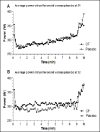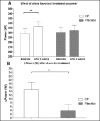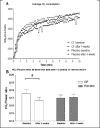Citrus Flavonoid Supplementation Improves Exercise Performance in Trained Athletes
- PMID: 29535575
- PMCID: PMC5844206
Citrus Flavonoid Supplementation Improves Exercise Performance in Trained Athletes
Abstract
Previous studies have shown that polyphenol supplementation may be an effective strategy to improve exercise performance, due to their antioxidant character and ability to stimulate NO production. These properties may contribute to exercise performance, yet no conclusive research has been performed in exploring the direct effects of citrus flavonoids on human exercise performance. Therefore, the purpose of this study was to assess whether supplementation of a customized citrus flavonoid (CF) extract for 4 weeks improves cycling time-trial performance in trained male athletes. In a double-blind, randomized, parallel study, 39 healthy, trained males were given a daily dose of either 500 mg of a customized citrus flavonoid extract (CF) or a placebo for 4 weeks. Exercise performance was tested by means of a time-trial test on a cycle ergometer, during which participants had to generate as much power as possible for duration of 10 minutes. Absolute power output significantly increased with 14.9 ± 3.9 W after 4 weeks of CF supplementation, corresponding with a 5.0% increase, compared to 3.8 ± 3.2 W (1.3% increase) in placebo (p < 0.05). In addition, oxygen consumption/power ratio significantly decreased in the CF group compared to placebo (p = 0.001), and a trend was found in the change in peak power output in CF (18.2 ± 23.2 W) versus placebo (-28.4 ± 17.6 W; p = 0.116). The current study is the first convincing report that citrus flavonoid supplementation can improve exercise performance, as shown by a significant increase in power output during the exercise test.
Keywords: Hesperetin; antioxidant; ergometer; power output; time trial.
Figures



Similar articles
-
Does Flavonoid Consumption Improve Exercise Performance? Is It Related to Changes in the Immune System and Inflammatory Biomarkers? A Systematic Review of Clinical Studies since 2005.Nutrients. 2021 Mar 30;13(4):1132. doi: 10.3390/nu13041132. Nutrients. 2021. PMID: 33808153 Free PMC article.
-
The effect of citrus flavonoid extract supplementation on anaerobic capacity in moderately trained athletes: a randomized controlled trial.J Int Soc Sports Nutr. 2021 Jan 6;18(1):2. doi: 10.1186/s12970-020-00399-w. J Int Soc Sports Nutr. 2021. PMID: 33407631 Free PMC article. Clinical Trial.
-
Ubiquinol supplementation enhances peak power production in trained athletes: a double-blind, placebo controlled study.J Int Soc Sports Nutr. 2013 Apr 29;10:24. doi: 10.1186/1550-2783-10-24. eCollection 2013. J Int Soc Sports Nutr. 2013. PMID: 23627788 Free PMC article.
-
Sodium nitrate supplementation does not enhance performance of endurance athletes.Med Sci Sports Exerc. 2012 Dec;44(12):2400-9. doi: 10.1249/MSS.0b013e3182687e5c. Med Sci Sports Exerc. 2012. PMID: 22811030 Clinical Trial.
-
Effects of inhaled bronchodilators on lung function and cycling performance in female athletes with and without exercise-induced bronchoconstriction.J Sci Med Sport. 2015 Sep;18(5):607-12. doi: 10.1016/j.jsams.2014.07.021. Epub 2014 Aug 9. J Sci Med Sport. 2015. PMID: 25156879 Clinical Trial.
Cited by
-
Does Flavonoid Consumption Improve Exercise Performance? Is It Related to Changes in the Immune System and Inflammatory Biomarkers? A Systematic Review of Clinical Studies since 2005.Nutrients. 2021 Mar 30;13(4):1132. doi: 10.3390/nu13041132. Nutrients. 2021. PMID: 33808153 Free PMC article.
-
Influence of Diets Enriched with Flavonoids (Cocoa and Hesperidin) on the Systemic Immunity of Intensively Trained and Exhausted Rats.Biomolecules. 2022 Dec 17;12(12):1893. doi: 10.3390/biom12121893. Biomolecules. 2022. PMID: 36551321 Free PMC article.
-
Mangifera indica L. Leaf Extract in Combination With Luteolin or Quercetin Enhances VO2peak and Peak Power Output, and Preserves Skeletal Muscle Function During Ischemia-Reperfusion in Humans.Front Physiol. 2018 Jun 8;9:740. doi: 10.3389/fphys.2018.00740. eCollection 2018. Front Physiol. 2018. PMID: 29937737 Free PMC article.
-
Acute Effects of Hesperidin in Oxidant/Antioxidant State Markers and Performance in Amateur Cyclists.Nutrients. 2019 Aug 14;11(8):1898. doi: 10.3390/nu11081898. Nutrients. 2019. PMID: 31416212 Free PMC article. Clinical Trial.
-
Rat Mucosal Immunity following an Intensive Chronic Training and an Exhausting Exercise: Effect of Hesperidin Supplementation.Nutrients. 2022 Dec 27;15(1):133. doi: 10.3390/nu15010133. Nutrients. 2022. PMID: 36615791 Free PMC article.
References
-
- Ahtiainen J.P., Pakarinen A., Alen M., Kraemer W.J., Hakkinen K. (2003) Muscle hypertrophy, hormonal adaptations and strength development during strength training in strength-trained and untrained men. European Journal of Applied Physiology 89(6), 555-563. - PubMed
-
- Baars K. (2006) Training for Endurance and Strength: Lessons from Cell Signaling. Medicine & Science in Sports & Exercise, 38(11), 1939-1944. - PubMed
-
- Baur J.A., Pearson K. J., Price N.L., Jamieson H.A., Lerin C., Kalra A., Prabhu V.V., Allard J.S., Lopez-Lluch G., Lewis K., Pistell P.J., Poosala S., Becker K.G., Boss O., Gwinn D., Wang M., Ramaswamy S., Fishbein K.W., Spencer R.G., Lakatta E.G., Le Couteur D., Shaw R.J., Navas P., Puigserver P., Ingram D.K., de Cabo R., Sinclair D.A. (2006) Resveratrol improves health and survival of mice on a high-calorie diet. Nature 444(7117), 337-342. - PMC - PubMed
-
- Bescós R., Sureda A., Tur J.A., Pons A. (2012) The effect of nitric-oxide-related supplements on human performance. Sports Medicine 2, 99-117. - PubMed
LinkOut - more resources
Full Text Sources
